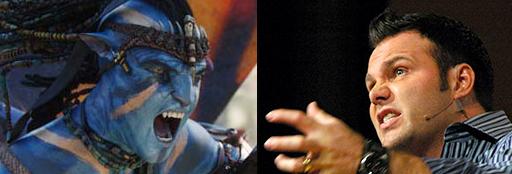Last week Dr. Metzger wrote on Ur about the novelty of multi-ethnic efforts in the church today. He asked whether justice was really taking root in our hearts, or is it just a trend. In this follow-up post he exposes our general blindness to injustice by referencing Mark Driscoll’s comments about the film Avatar. If you recall, earlier this year Driscoll called the James Cameron film “the most satanic movie I’ve ever seen.” A video with his full rant against the film can be viewed below.
Some friends drew my attention to the YouTube post of Pastor Mark Driscoll’s sermon where he critiques the movie Avatar. I don’t know Pastor Driscoll, but I have watched the movie. There were two things that struck me about his remarks: his rightful concern for orthodoxy coupled with his desire for Christians to think critically about the worldviews that films present such as pagan spirituality; and his conviction that the movie attacks cultural progress.

Whether or not the director, James Cameron, intended to promote a pantheistic perspective (everything is God), I do concur with Driscoll that a pantheistic or monistic view of reality proves problematic for consideration of sin and evil—if we are one with the divine in our creaturely state, how can we be sinners? It also proves problematic for consideration of the need for a Savior—if we are ultimately one with God, why do we need a Savior to remove the separation? From a pantheistic or monistic perspective, separation is not moral or ontological; it is basically mental. According to this model, our sinful state is one of illusion. We fail to see things as they truly are, and we must cease living the lie and get in touch with our true selves which is not beyond us, but rather within us (what Driscoll refers to as the spark of divinity). I should also add that it is ultimately impossible to differentiate good from evil in a pantheistic or monistic framework: good and evil proceed from one ultimate reality, which is beyond good and evil.
So, I commend Pastor Driscoll for his biblical and theological convictions regarding pantheism. And yet I don’t find his brief statements on Avatar orthodox enough. Here I have in mind Pastor Driscoll’s statement that the movie attacks cultural progress.
Driscoll rightly detects in the film a social commentary and a profound critique leveled at a certain kind of cultural progress. Avatar is the story of two cultures. One culture “progresses” by ravaging neighboring cultures and destroying the surrounding ecosystem. The other culture “progresses” by a “shared life” approach: living communally as grateful stewards of the environment, never taking more than is necessary for the survival of the tribe. I have a hard time imagining how ravaging an indigenous people’s cultural habitat and stripping the land to obtain a mineral prized by the dominant culture on another planet signifies cultural progress. Nor do I find that it lines up with God’s prophetic word concerning caring for the poor and helpless in Isaiah or in James (Isaiah 58:5-11; James 1:26-27).
In his remarks Pastor Driscoll does not demonstrate how problematic those agents of cultural progress on Pandora were in their oppression of the Native people. It was a page right out of American history. See U.S. Senator Daniel K. Inouye’s foreword to Documents of American Indian Diplomacy: Legal History of North America Series #4. There Senator Inouye writes that the more than 800 treaties made with indigenous peoples over our nation’s history were broken or never ratified. See also Karl Menninger’s discussion of the atrocities and oppression of native peoples in our land in Whatever Became of Sin?
We must use technology for true cultural progress—that which benefits all people, especially the poor and the voiceless. While the paraplegic marine who takes on Avatar form to save the Na’vi pales in comparison to Jesus, at the very least he does not oppress the indigenous people but rather sacrifices himself for them.
What is beyond me is that Driscoll believes the movie promotes negative forms of consumption rather than generosity; it is quite clear that the movie condemns the corporate and military powers for greed and violence. Driscoll should be affirming the movie’s critique of these injustices rather than attacking the movie as propaganda against cultural progress. It leads me to wonder just how tone deaf we (not just Pastor Driscoll) are to the plight of indigenous cultures and their habitats, even in the twenty-first century. Given his power and authority, I plead with Pastor Driscoll to wed orthopraxy to orthodoxy (right practice to right doctrine) and to use his position to advocate on behalf of the marginalized and oppressed indigenous peoples in our day.
The movie Avatar was not simply a movie to Pastor Driscoll. Nor was his critique of this movie simply poor cultural critique to me. It was a symbolic statement of total blindness to what the Western powers have done and continue to do in our day to indigenous peoples and their habitats globally all in the name of progress.
Avatar‘s just a movie, which Driscoll calls “a sermon preached.” Driscoll’s talk is just a sermon point, which it seems Mars Hill turned into a YouTube video clip. And ours is just a generation, which is a movement in the making, swayed by the Camerons and Driscolls on the left and on the right. And so, the movie is more than a movie. The sermon is more than a sermon. Movies and sermons turn generations into movements, but movements toward what end? It’s one thing for us to have justice packages in church that enable us to give charity to people in need—like indigenous people groups whom the Western world continues to oppress, but never spend ourselves on their behalf. Isaiah 58 tells us to spend ourselves on behalf of the poor and oppressed. A missionary to Native Americans was once told by them that, “We will believe in your Jesus when you come and live and die with us.” It will require that we wed orthodoxy—right views of the incarnation to orthopraxy—right applications in view of the incarnation.”
I discussed this movie and sermon clip with a group of young leaders in a course on apologetics. When I finished my critique of Pastor Driscoll’s critique of Avatar, I asked the class what they thought of the movie, Driscoll’s reflections, and my own. One person responded to my critique by saying, “I would rather not think about these things. Where I live and work, I never have to think about these things. If I do, then I would sense some guilt and responsibility and would sense that I have to do something about them. I would rather do something else.” Such an honest, powerful and revealing statement. It’s a statement I should have made for myself. I would rather think about something else, because if I think about this, who knows what will happen? Who knows what I will have to do? Who knows what the Lord will call me to be?
As the community of the crucified and risen Jesus, we must become the living apologetic even as we live out our apology among the native peoples—not as mere Avatars who simply appear to incarnate the divine, but as Jesus’ body, participating in his incarnate and cruciform life. I am more crippled than the paraplegic marine in Avatar—often failing to walk the walk. Lord, grant us courage and cause us to be your hands and feet.









